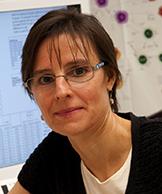
Research Topics
The primary focus of our research program is to study the role of B cells in the pathogenesis of HIV disease, with the ultimate goal of filling gaps in knowledge regarding humoral immunity against the virus. This knowledge is critical to the development of an effective antibody-based vaccine and for advancement of immunotherapeutic interventions in HIV-infected individuals. Our approach involves assessing transcriptional, phenotypic, and functional attributes of B cells that circulate in the peripheral blood and those that reside in tissues, particularly lymph nodes and the bone marrow. A major focus of our research also includes identifying and characterizing various subsets of B cells in blood and tissues of healthy individuals that are overexpressed at various stages of HIV infection. We have shown that several of these subsets may be responsible for various manifestations associated with HIV disease, including hypergammablobulinemia, inadequate response to vaccination, as well as loss of homeostasis and lymphopenia. Another long-term goal is to apply our knowledge of B cells in HIV to other human diseases in which B cells play a pathogenic role.
Biography
Dr. Moir received her Ph.D. in immunology and microbiology from the University Laval, Quebec City, Quebec, Canada, in 1996. Her Ph.D. studies were supported by a scholarship from the National Health Research and Development Program of Canada. In 1996, Dr. Moir came to the NIAID Laboratory of Immunoregulation (LIR) as a Visiting Fellow. Dr. Moir was appointed to the position of Staff Scientist in 2006, with honorific title of Associate Scientist in 2010. In 2009, the National Institutes of Health (NIH) launched a new recruiting program named for the late Earl Stadtman, an NIH biochemist who mentored several Nobel laureates. Dr. Moir was selected as one of the 2014-2015 Earl Stadtman Investigators and received a tenure track investigator position in the LIR in August 2015.
Selected Publications
- Buckner CM, Kardava L, El Merhebi O, Narpala SR, Serebryannyy L, Lin BC, Wang W, Zhang X, Lopes de Assis F, Kelly SEM, Teng IT, McCormack GE, Praiss LH, Seamon CA, Rai MA, Kalish H, Kwong PD, Proschan MA, McDermott AB, Fauci AS, Chun TW, Moir S. Interval between prior SARS-CoV-2 infection and booster vaccination impacts magnitude and quality of antibody and B cell responses. Cell. 2022;185(23):4333-4346.e14.
- Sneller MC, Blazkova J, Justement JS, Shi V, Kennedy BD, Gittens K, Tolstenko J, McCormack G, Whitehead EJ, Schneck RF, Proschan MA, Benko E, Kovacs C, Oguz C, Seaman MS, Caskey M, Nussenzweig MC, Fauci AS, Moir S, Chun TW. Combination anti-HIV antibodies provide sustained virological suppression. Nature. 2022;606(7913):375-381.
- Kardava L, Sohn H, Youn C, Austin JW, Wang W, Buckner CM, Justement JS, Melson VA, Roth GE, Hand MA, Gittens KR, Kwan RW, Sneller MC, Li Y, Chun TW, Sun PD, Pierce SK, Moir S. IgG3 regulates tissue-like memory B cells in HIV-infected individuals. Nat Immunol. 2018;19(9):1001-1012.
- Austin JW, Buckner CM, Kardava L, Wang W, Zhang X, Melson VA, Swanson RG, Martins AJ, Zhou JQ, Hoehn KB, Fisk JN, Dimopoulos Y, Chassiakos A, O'Dell S, Smelkinson MG, Seamon CA, Kwan RW, Sneller MC, Pittaluga S, Doria-Rose NA, McDermott A, Li Y, Chun TW, Kleinstein SH, Tsang JS, Petrovas C, Moir S. Overexpression of T-bet in HIV infection is associated with accumulation of B cells outside germinal centers and poor affinity maturation. Sci Transl Med. 2019;11(520).
- Lopes de Assis F, Hoehn KB, Zhang X, Kardava L, Smith CD, El Merhebi O, Buckner CM, Trihemasava K, Wang W, Seamon CA, Chen V, Schaughency P, Cheung F, Martins AJ, Chiang CI, Li Y, Tsang JS, Chun TW, Kleinstein SH, Moir S. Tracking B cell responses to the SARS-CoV-2 mRNA-1273 vaccine. Cell Rep. 2023;42(7):112780.
Related Scientific Focus Areas


Microbiology and Infectious Diseases
View additional Principal Investigators in Microbiology and Infectious Diseases
This page was last updated on Thursday, September 19, 2024